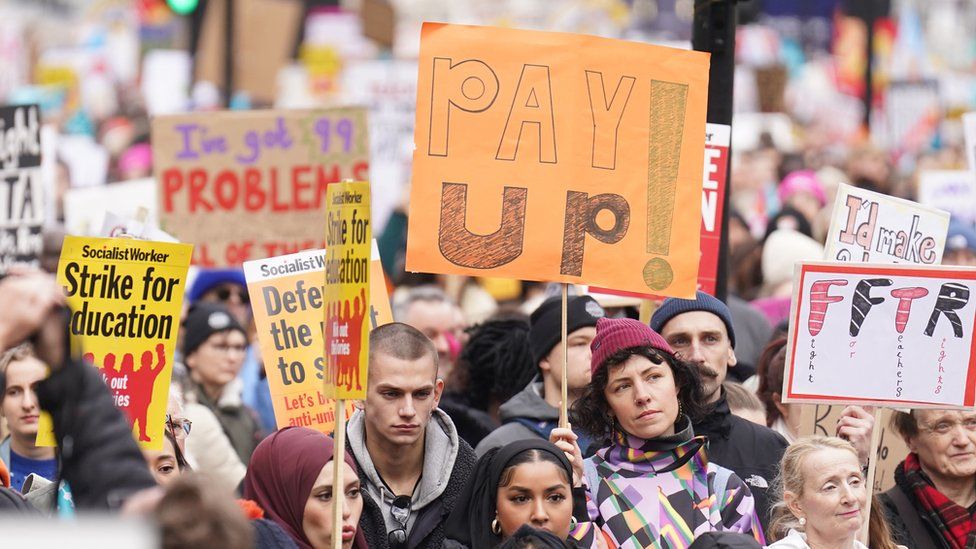Public sector workers offered pay rise of around 6%

Millions of public sector workers, including teachers, police and junior doctors, have been offered pay rises between 5%-7%, the government says.
Under the proposals, police and prison officers would receive a 7% pay rise, while teachers and junior doctors would get a 6.5% and 6% rise respectively.
Four unions said the deal would allow teachers’ strikes to be called off.
Asked how he would pay for increases, Rishi Sunak said it would “mean choices – I’m not shying away from that”.
“It’s not about cuts, it’s just about focusing on public sector workers’ pay rather than other things,” he added, insisting changes could be made “without impacting frontline service delivery”.
He also said the government would raise over £1bn by “significantly” increasing charges for migrants coming to the UK when they apply for visas and the levy they pay to access the NHS.
The prime minister ruled out funded the increases through extra borrowing or increasing taxes.
Mr Sunak said pay awards in the education department would be fully funded, but did not set out details how it would be achieved.
Continuing strikes?
Rising prices have also prompted industrial action among other public sectors, with workers calling for pay rises matching or exceeding the rate of inflation which currently stands at 8.7%.
But with the education unions responding warmly to the government’s offer, parents and pupils could see an end to strikes which have impacted schools across England over the past year.
The four education unions said they would put the offer to their members in England with a recommendation to accept the pay award.
On Thursday, junior doctors in England began a five day walkout, after their calls for a 35% pay increase were rejected.
The government has been resistant to offering above-inflation pay rises warning it would further fuel inflation.
TUC general secretary Paul Nowak said union members would take “comfort” from the fact that the prime minister had accepted the pay review bodies’ recommendations.
“The question will be – is he able to deliver pay rises in a way that won’t have a negative impact on services. Our members will have a long look at that – they won’t want to see Peter robbed to pay Paul.”
Mr Sunak said his offer was “final” and further industrial action would not change that decision, saying: “There will be no more talks on pay. We will not negotiate again on this year’s settlements and no amount of strikes will change our decision.”
This video can not be played
To play this video you need to enable JavaScript in your browser.

What pay rises have been offered?
- Police officers: 7% (England & Wales)
- Consultants, dentists and GPs: 6% (England)
- Junior doctors: 6% + £1,250 consolidated increase (England)
- Prison officers: 7% and more for support grades (England & Wales)
- Armed forces: 5% + £1,000 consolidated increase (UK)
- Teachers: 6.5% (England)

In the Commons, Treasury Minister John Glen told MPs the government would cut back on civil service recruitment in the Ministry of Defence until March 2025 to help fund the rise for the armed forces.
Shadow Treasury minister Pat McFadden asked Mr Glen about the impact on public services. “[He] talked of reprioritising. Does that mean the government will cut back on capital investment in schools and hospitals to fund these increases?”
The FDA union, which represents senior civil servants, welcomed the government’s decision to accept the pay review body’s recommendations, calling the advice “fair and reasonable”.
Official figures released earlier this week found that UK pay overall grew by 7.3% in the March to May period, compared to the previous year.

What are pay review bodies?
Almost half of public sector workers are covered by pay review bodies, including police and prison officers, the armed forces, doctors, dentists and teachers.
The pay review bodies are made up of economists and experts on human resources, with experience in both the public and private sector and are appointed by the relevant government department.
Their recommendations are not legally binding, meaning the government can choose to reject or partially ignore the advice, but it is usually accepted.
Related Topics
- Public sector
- Pay
-
Why is UK inflation so high?
-
2 days ago

-
-
Record pay rises fuel fresh inflation fears
-
1 day ago

-
-
Teachers’ strikes: When, where and why?
-
35 minutes ago

-
Published at Thu, 13 Jul 2023 13:32:20 +0000
